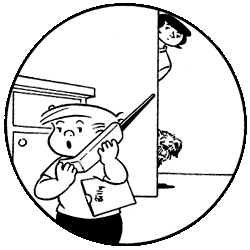When Ed Rendell was elected to the governorship of Pennsylvania four years ago, he sailed through on a promise of lowering property taxes, especially for the poor and elderly. Leaving aside that Democrats seem to do everything for the poor and elderly, let's examine Rendell's success.
Four years later, property taxes haven't been altered. Thanks, Ed. Way to go.
We did have that ridiculous Act 72. It was a plan to force school districts to lower property taxes and forbid them to raise them faster than inflation. The balance of their operating costs would be furnished by money from slots parlors.
"But gee!" you say, "I didn't know Pennsylvania had gambling parlors!" Well, before Rendell, you would have been right. Rendell was unable to accomplish his goal of lowering property taxes, but he sure opened the state to gambling. Thanks, Ed. Way to go. Oh, and by the way, nearly 80% of the state's school districts rejected this plan.
Now, here is where it gets even more interesting. According to the Governor's Own Webpage, 34% of the income from the slots parlors will go to offset the property tax decreases. Hmmm.
Let's crunch some numbers to see what this means. Suppose, for instance, that across the state we want to save just $100 in property taxes. Now, everyone pays a combined total of $100 less, because the State is going to give that $100 back from slot money. Sounds great!
The State gets that $100 by taxing the slots parlors at 34%. In other words, for this system to break even, $100 has to equal 34% of slots revenue. That means 100=0.34r, which tells us that r=$294.12.
So, in order to save the people $100, the people need to pay $294.12 at the slots parlors. The State just saved the people negative $194.12.
Thanks, Ed. Way to go. Oh, and just take a wild guess who will be pouring the most money into the slots: the poor and elderly, because they are the most attracted to the idea of winning a fortune at these parlors. Way to embrace that Democrat ideal.
To now use some more realistic numbers, the Governor's page says that each homeowner would save an average of $333. This means that the slots parlors need to take in $979.41 for every single homeowner in the state. In other words, I could take that money I saved on my property taxes, use it at the casino, and then go into debt for the remaining $646.41 so that the system can break even. Too bad that doesn't leave me any money left over to buy some KY for the raping the government is giving me.
To me it seems like this should be a simple issue. If you want people to pay less to the schools, the schools either need to spend less (gasp!) or they need to get money from elsewhere. If the money comes from the same people spending more elsewhere, you are not saving anything. It is akin to driving 400 miles to fill your gas tank for $0.06 less per gallon. Overall, you lose.
